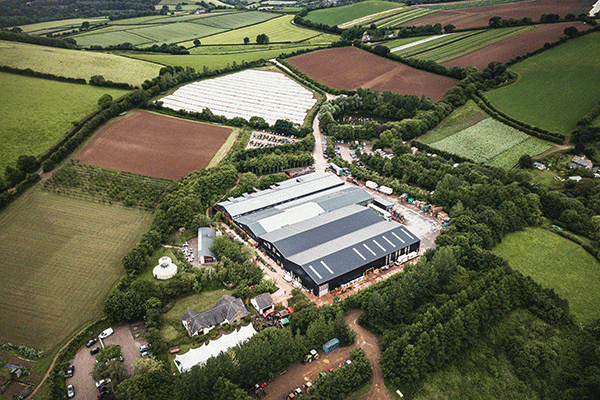The climate and ecological crises are an existential threat to humanity. If we don’t act as fast as possible to tackle global warming and biodiversity decline, we cannot hope to provide a safe future for the generations who must live in our wake.
At Riverford, we consider the environmental impact of all our decisions – but the technology, systems and innovation needed to support widespread change often sit outside of our normal, day-to-day activities. That’s why we’ve decided to ringfence money which can be used outside of everyday business, to speed up our investment in major sustainability projects.
We’ve seeded our new Planet Fund with an initial £1.8 million from our profits (possible thanks to an exceptional year in 2020-21), and committed to adding to this every year. The fund will support what we’ve dubbed ‘Riverford Planet Action’, our work to help build a more sustainable world.
This is split into three key pillars: our Climate Plan (we’ve pledged to reach net zero carbon emissions in the operations under our direct control by 2030), Biodiversity Plan (encouraging wildlife on our farms and beyond), and Farming for the Future Plan (working with our suppliers to develop more sustainable ways of producing food).

Parts of these plans cover core aspects of how we work every day. Electric vans, solar panels, or carbon emission monitoring; we consider these non-negotiable ‘brilliant basics’, which need to be factored in as part of how we do business, and not paid for out of the Planet Fund. We will continue to invest in them separately, as we have done for some time.
Instead, this exceptional funding will be used to drive projects which go above and beyond the everyday – such as early adoption of green technology (e.g. electric HGVs), innovative biodiversity improvements, ways to sequester carbon in the soil, hedges and woodlands of our own and our suppliers’ farms, and lots more.
Several brilliant projects are already underway; we’re supporting a fruit tree planting project in southern Ethiopia, providing nutrition and extra income for local people as well as sequestering carbon. And a biodiversity project is ongoing on our Devon farm, improving the habitat for all sorts of wildlife.
We’ll share all the details of these and many more projects in the coming months – watch this space. Find out more at riverford.co.uk/planet-action.













Hi, I read in the recent vegbox newsletter about the need to invest in more polytunnels and better storage to improve dealing with the shoulders of the growing seasons. Is this something the co-owners would like to get customers to invest in as a crowdfund, perhaps sharing some modest benefit in kind instead of cash interest? I would certainly be interested.
This undertaking for new projects, supported by Wicked Leeks, is exactly what is needed. Private money and resources are essential to engage with and counter the established methods of farming, and to research and deliver the essential science that supports sustainable agriculture. Building on that we can further understand how the ‘One Health Concept’ can be a driver for what we seek in our pursuit of a better, healthier life for humans and animals and for our planet.
This is weird, I was just looking at the One Health concept last night. I think it’s a superb concept, and it has really organised my own thoughts about how the health of humans, plants, animals (wild and farmed), and ecosystems are all linked. It seems like common sense but this type of idea is sorely missing from western societies especially. It seems like a great set of guiding principles but I wonder how it gets integrated in reality.
How to integrate One Health into reality? Health and resistance to pathogen associated diseases, are maintained by immune systems. Though most people are aware of the antibody system in humans and animals, few are aware that higher animals including man have another immune system, called the Innate. Insects and plants have this system, but they don’t have an antibody system. This Innate system has been conserved over millions of years. The innate immune system of insects is very similar to that of higher animals. The active components of this system are called Antimicrobial Peptides (AMPs) or Nature’s Antibiotics. Unlike conventional antibiotics that just act against bacteria, these AMPs are also active against virus, fungi and parasites. Insect AMPs are active against animal pathogens. Insect AMPs can supplement a higher animals immune system, by the complex procedure of ‘Ingestion’! Disruption of an animals ability to produce its own AMPs, either through genetic predisposition or pathogen suppression, can lead to pathogen related diseases. This can be addressed by Insects with their AMP repertoire. The role of some insect biodiversity, (flies/beetles) is amongst others, to recycle biomass, and in the instance it has been infected, to regenerate it to be safe (without pathogens or greatly reduced) for the health benefit of other animals in the ecosystem. It is my belief that worms can be a source of AMPs for plants, taken up by the root hairs within the rhizosphere. In maintaining the health of plants and animals, the soil is protected, becomes a carbon sink. Integrated health underpinned by a common immune system – One Health.